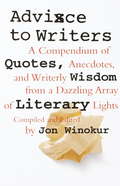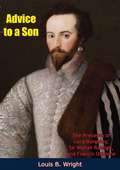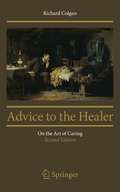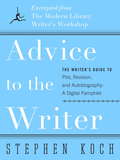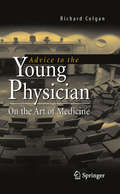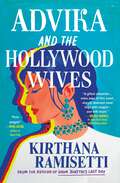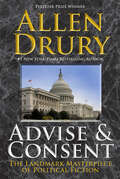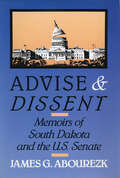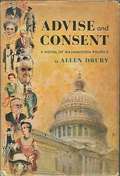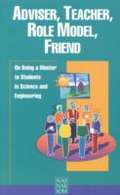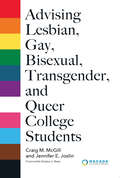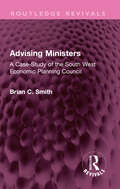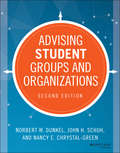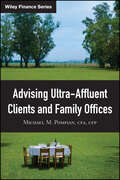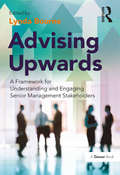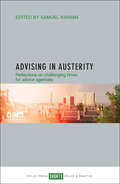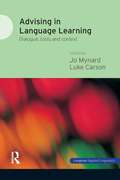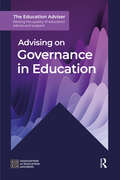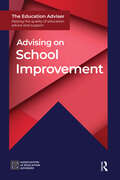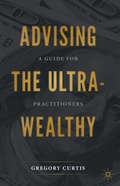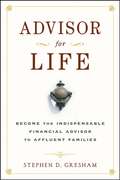- Table View
- List View
Advice to Writers: A Compendium of Quotes, Anecdotes, and Writerly Wisdom from a Dazzling Array of Literary Lights
by Jon WinokurJon Winokur, author of the bestselling The Portable Curmudgeon, gathers the counsel of more than four hundred celebrated authors in a treasury on the world of writing. Here are literary lions on everything from the passive voice to promotion and publicity: James Baldwin on the practiced illusion of effortless prose, Isaac Asimov on the despotic tendencies of editors, John Cheever on the perils of drink, Ivan Turgenev on matrimony and the Muse. Here, too, are the secrets behind the sleight-of-hand practiced by artists from Aristotle to Rita Mae Brown. Sagacious, inspiring, and entertaining, Advice to Writers is an essential volume for the writer in every reader.
Advice to a Son: The Precepts of Lord Burghley, Sir Walter Raleigh, and Francis Osborne
by Louis B. Wright“Guides to conduct are common to all ages, for writers never cease to believe that the distillation of their wisdom will in some fashion improve the behavior of youth and provide useful instruction to their elders. The sixteenth century was a particularly didactic age and had more than its share of self-appointed instructors with faith in their missions.” So writes Louis B. Wright in his Introduction to Advice to a Son.This volume makes available three of the most famous sets of precepts. The manuals attributed to Lord Burghley and Sir Walter Raleigh and a treatise compiled by Francis Osborne are indicative of both the aspirations and the morals of the sixteenth and seventeenth centuries, and they provide an index to the social attitudes of the age.Immensely popular and influential, they were often reprinted, quoted from, and plagiarized. Some students of Shakespeare profess to see a parallel between Polonius advice to Laertes and Burghley’s practical counsel to his son Robert.The advice that these treatises offer is materialistic and even cynical, because the writers, moving in a political milieu, were realists who were attempting to provide instruction to their sons that would ensure success they would have cared not at all for the idealistic niceties. The distinction and position of Burghley and Raleigh may in part account for the popularity of their manuals in the seventeenth century, long after their deaths, but obviously both works possessed qualities congenial to the age, and readers approved of the way they mingled virtue and pragmatism.Of the three works, Dr. Wright comments, Osborne’s “must be regarded as a literary creation in addition to being a practical manual composed for the use of a particular person.”The student of English history will find this book a valuable addition to his library.
Advice to a Young Scientist
by P. B. MedawarTo those interested in a life in science, Sir Peter Medawar, Nobel laureate, deflates the myths of invincibility, superiority, and genius; instead, he demonstrates it is common sense and an inquiring mind that are essential to the scientist’s calling. He deflates the myths surrounding scientists--invincibility, superiority, and genius; instead, he argues that it is common sense and an inquiring mind that are essential to the makeup of a scientist. He delivers many wry observations on how to choose a research topic, how to get along wih collaborators and older scientists and administrators, how (and how not) to present a scientific paper, and how to cope with culturally ”superior” specialists in the arts and humanities.
Advice to the Healer: On the Art of Caring
by Richard ColganThis book introduces the origins of important teachings that form the basis of medicine and related healing professions. Reinforcing the humanistic side of patient care, this book replicates the tips, anecdotes and aphorisms often related by mentors and educators to medical students, residents, and young physicians. This book provides numerous examples of best practices in the art of medicine, profiles of great healers throughout history and around the world, and stories sure to inspire any practicing healer, whether they are new to the calling or a seasoned veteran.
Advice to the Writer
by Stephen KochFrom Stephen Koch, former chair of Columbia University's graduate creative writing program, comes essential and practical advice drawn from The Modern Library Writer's Workshop. With nearly thirty years of teaching experience, Stephen Koch has earned a reputation as an astute and benevolent mentor; and with Advice to the Writer, his lucid observations and commonsense techniques have never been more accessible. Here Koch dispenses sound guidance for those moments when the muse needs a little help finding her way: in "Shaping the Story," he untangles plot; in "Working and Reworking," he explains the most teachable (yet least often taught) of all writerly skills: revision; and in "The Story of the Self," he delves into autobiography. Featuring handpicked commentary from some of our greatest authors, Advice to the Writer is a unique introduction to this maddening and intoxicating pursuit. Praise for Stephen Koch's The Modern Library Writer's Workshop "An extraordinarily comprehensive and practical work by a master craftsman and a master analyst of the craft."--Madison Smartt Bell, author of All Souls' Rising and Anything Goes "Stephen Koch was my teacher long ago. Now he is everyone's teacher, indelibly. This is a book not just for the beginning writer but for every writer."--Martha McPhee, author of the National Book Award nominee Gorgeous Lies "The Modern Library Writer's Workshop is a treasure trove of wisdom, both immensely practical and philosophical, entertaining and thought-provoking. Koch takes us inside the writing process, and it is impossible not to emerge transformed."--Joanna Hershon, author of Swimming
Advice to the Young Physician: On the Art of Medicine
by Richard ColganAdvice to the Young Physician introduces the origins of important teachings that form the basis of medicine as it has been taught by some of history's greatest educators in medicine. Advice to the Young Physician reveals how to make the transition from technician to healer. This book reinforces the humanistic side of patient care, which is often overshadowed by the focus on highly technological elements. Medical students, residents, fellows, physicians, and allied health practitioners often forget the intricacies of the genomic makeup of adenoviruses, yet they remember the tips, anecdotes and aphorisms related by mentors, educators, and experienced physicians. The art of medicine comes from insights gained from unique and dynamic experiences between the physician, an enthusiastic medical student and the human patient, and is rarely found in books or taught in a universal and systematic way. Advice to the Young Physician provides numerous examples of best practices in order to internalize and practice the art of medicine, including tenets taught by Hippocrates, Maimonides, Osler, Peabody, Schweitzer and others. Advice to the Young Physician targets aspiring and new physicians with the intent to make them better physicians. It hits the mark. An effective mix of the writings of some of medicine's giants, as well as clinical experiences of the author, the book offers an historical framework and personal context to understand the attributes and attitudes of the good physician. It is a quick read that rewards the reader with a sampling of 4000 years of medical wisdom sprinkled with practical advice for the modern day doctor. --Richard G. Roberts, MD, JD, Professor of Family Medicine, University of Wisconsin School of Medicine and Public Health, President World Organization of Family Doctors, Past President American Academy of Family Physicians This is a small book and easy to read. It comprises several inspiring sketches of ancient and modern physicians whose reputations were based as much on their dedication to the humanism of medicine as it was to the science of medicine. Those who teach medical students and residents will find it a good source of medical history that, besides being important in itself, will add a new dimension and a little lightness to morning rounds. The author makes it clear that in our era of high technology it is easy to underestimate the importance of uniting humanism with science in caring for the sick. He also provides some practical information on such topics as how to present a case to attending physicians and how to communicate well with patients. The ancient physicians that history remembers were not only astute observers of signs and symptoms but also were deeply concerned about the psychological health of their patients and how disturbances in their emotional health often manifested in physical symptoms. Colgan starts with Hippocrates and Maimonides whose names many young physicians are familiar with. The former for the aphorism "first do no harm" and the latter for being one of the first to call medicine a "vocation" and a "calling." The following "greats" are included in the book: Dr Albert Schweitzer whose "reverence for life" led him to his missionary medical work in Africa. He wrote Out of My Life and Thought and received the Nobel Peace Prize in 1952. Sir William Osler (1849-1919), known to some as the father of internal medicine, was a respected physician and teacher. He was the author of the Principles and Practice of Medicine, used for decades as the bible of medicine. But his fame rested equally on his dedication as a mentor to young physicians. He often gave graduation addresses to medical students reminding them to maintain a life-long interest in continuous learning and to treat the whole patient not just the disease. Francis Weld Peabody (1881-1927) a teacher at Harvard who had written a book The Care of the Patient in which he discussed how older practitioners often complained that younger doctors' mindsets were so often over-concerned with testing that they sometimes fo...
Advika Consulting Services: Challenges and Opportunities in Managing Human Capital
by Francesca Gino Bradley R. Staats Alison Wood Brooks Julia J. LeeAdvika Consulting Services: Challenges and Opportunities in Managing Human Capital by Alison Wood Brooks, Francesca Gino, Julia J. Lee and Bradley R. Staats
Advika and the Hollywood Wives
by Kirthana RamisettiA page-turning tale of marriage, scandal, and fame, perfect for readers of Taylor Jenkins Reid: &“The glitz and underlying darkness of Hollywood make for a setting as complex and compelling as Ramisetti's characters . . . rings with insight—and with heart&” (Meena Harris, #1 New York Times bestselling author). At age 26, Advika Srinivasan considers herself a failed screenwriter. To pay the bills and keep her mind off of the recent death of her twin sister, she&’s taken to bartending A-list events, including the 2015 Governors Ball, the official afterparty of the Oscars. There, in a cinematic dream come true, she meets the legendary Julian Zelding—a film producer as handsome as Paul Newman and ten times as powerful—fresh off his fifth best picture win. Despite their 41-year age difference, Advika falls helplessly under his spell, and their evening flirtation ignites into a whirlwind courtship and elopement. Advika is enthralled by Julian&’s charm and luxurious lifestyle, but while Julian loves to talk about his famous friends and achievements, he smoothly changes the subject whenever his previous relationships come up. Then, a month into their marriage, Julian&’s first wife—the famous actress Evie Lockhart—dies, and a tabloid reports a shocking stipulation in her will. A single film reel and $1,000,000 will be bequeathed to &“Julian&’s latest child bride&” on one condition: Advika must divorce him first. Shaken out of her love fog and still-simmering grief over the loss of her sister—and uneasy about Julian&’s sudden, inexplicable urge to start a family—Advika decides to investigate him through the eyes and experiences of his exes. From reading his first wife&’s biography, to listening to his second wife&’s confessional albums, to watching his third wife&’s Real Housewives-esque reality show, Advika starts to realize how little she knows about her husband. Realizing she rushed into the marriage for all the wrong reasons, Advika uses the info gleaned from the lives of her husband&’s exes to concoct a plan to extricate herself from Julian once and for all.Includes a Reading Group Guide.
Advise & Consent: The Landmark Masterpiece of Political Fiction
by Allen DruryThe #1 New York Times bestseller and Pulitzer Prize winner. Allen Drury’s Advise and Consent is one of the high points of 20th Century literature, a seminal work of political fiction—as relevant today as when it was first published. A sweeping tale of corruption and ambition cuts across the landscape of Washington, DC, with the breadth and realism that only an astute observer and insider can convey. Allen Drury has penetrated the world’s stormiest political battleground—the smoke-filled committee rooms of the United States Senate—to reveal the bitter conflicts set in motion when the President calls upon the Senate to confirm his controversial choice for Secretary of State. This novel is a true epic showing in fascinating detail the minds and motives of the statesmen, the opportunists, the idealists. From a Senate old-timer’s wily maneuvers, a vicious demagogue’s blistering smear campaign, the ugly personal jealousies that turn a highly qualified candidate into a public spectacle, to the tragic martyrdom of a presidential aspirant who refuses to sacrifice his principles for his career—never has there been a more revealing picture of Washington’s intricate political, diplomatic, and social worlds. Advise and Consent is a timeless story with clear echoes of today’s headlines. Includes Allen Drury’s never-before-published original preface to Advise and Consent, his essay for the Hoover Institution on the writing of the book, as well as poignant personal memoirs from Drury’s heirs.
Advise & Dissent: Memoirs of South Dakota and the U.S. Senate
by James AbourezkThe life story of the founder of ADC, from his parents' farm in South Dakota to the halls of the Senate, where he refused to compromise his principles.
Advise and Consent
by Allen DruryThe United States Senate reacts to the nomination of Robert Leffingwell, a former Communist Party member, as United States Secrety of State. <P><P> Winner of the Pulitzer Prize.
Adviser, Teacher, Role Model, Friend: On Being a Mentor to Students in Science and Engineering
by National Academy of Engineering Staff National Academy of Sciences Staff Institute of Medicine StaffThis guide offers helpful advice on how teachers, administrators, and career advisers in science and engineering can become better mentors to their students. It starts with the premise that a successful mentor guides students in a variety of ways: by helping them get the most from their educational experience, by introducing them to and making them comfortable with a specific disciplinary culture, and by offering assistance with the search for suitable employment. Other topics covered in the guide include career planning, time management, writing development, and responsible scientific conduct. Also included is a valuable list of bibliographical and Internet resources on mentoring and related topics. Single copy, $19.95; 2-9 copies, $17.50 each; 10 or more copies, $16.95 (no other discounts apply).
Advising Families on Estate Planning
by Robert C. Pozen Lucas W. GoodmanSean Warrick is an estate planning adviser at Hellwig & Macon. He is preparing for meetings with two clients. His first clients are Peggy and David Bartley, a professional married couple of moderate wealth. His second clients are Ray and Michelle Polanski, a couple that married late in life and had highly asymmetrical wealth and age. In the case, Warrick is reading a report written by Peter Sullivan, a top estate planning adviser, which considers how estate planning strategies might need to change due to recent changes in estate tax law. Specifically, Warrick must decide whether each couple should continue with their preexisting estate planning strategy, whether they should modify this strategy somewhat, or whether they should abandon their current strategy entirely.
Advising Lesbian, Gay, Bisexual, Transgender, and Queer College Students
by Craig M. McGillCo-published with NACADA.Changes on college and university campuses have echoed changes in U.S. popular culture, politics, and religion since the 1970s through unprecedented visibility of LGBTQA persons and issues. In the face of hostile campus cultures, LGBTQA students rely on knowledgeable academic advisors for support, nurturance, and the resources needed to support their persistence. This edited collection offers theoretical understanding of the literature of the field, practical strategies that can be implemented at different institutions, and best practices that helps students, staff, and faculty members understand more deeply the challenges and rewards of working constructively with LGBTQA students. In addition, allies in the field of academic advising (both straight/cis-identified and queer) reflect on becoming an ally, describe obstacles and challenges they have experienced and offer advice to those seeking to deepen their commitment to ally-hood.
Advising Ministers: A Case-Study of the South West Economic Planning Council (Routledge Revivals)
by Brian C SmithFirst published in 1969, Advising Ministers is a general account of the arrangements for ‘advising Ministers’, based on a case-study, enabling the reader to judge the effectiveness of an advisory body in a particular case, which itself gained much publicity and in which hopes were high that results would be achieved. Mr. Smith’s conclusions are based on published material and informed, shrewd deduction to provide a valuable addition to the all too meagre case-study material on British administration. This book will be of interest to students of history, sociology, economics and political science.
Advising Student Groups and Organizations (Higher And Adult Education Ser.)
by John H. Schuh Nancy E. Chrystal-Green Norbert W. DunkelThe only manual for faculty and staff who work directlywith student organizations Advising Student Groups and Organizations is aone-of-a-kind book that equips faculty members and administratorsto competently and confidently serve as advisers to clubs and otherstudent groups. The second edition is here to help colleges anduniversities keep up with the skyrocketing number of student groupsand shifts in the legal landscape. New chapters on crucial topics,updated case studies, and a full suite of practical resourcessimplify the process of navigating student organizations.With Advising Student Groups and Organizations, educatorscan turn the chore of advising into a rewarding activity thatbenefits everyone. Challenges like student apathy, universitypolitics, and budgetary restrictions can be overcome with the ideasand activities presented here. And in this fully updated edition,new chapters contain everything you need to know about:Advising fraternities and sororitiesNavigating laws such as FERPA, Title IX, and the Clery ActWorking with online distance students and using social media asan advising toolConflict mediation and training student advisorsYou'll want to keep this guide handy so you can take advantageof tools like reflection questions, activities, checklists, andsample forms. Advising Student Groups and Organizations evencovers the use of assessments such as True Colors andStrengthsFinder. Now you'll be able to cut through bureaucracy tomake the student advising experience truly transformative.
Advising Ultra-Affluent Clients and Family Offices
by Michael PompianA timely guide for financial professionals looking to tap into the lucrative world of the ultra-affluentThe ultra affluent-defined here as those having $50 million or more in liquid assets-are an elite class who expect their financial advisors to not only preserve and grow their assets, but also help them with "soft" issues such as philanthropy and family governance. One of the biggest factors to success in this field is the relationship between the client and the advisor. In Advising Ultra-Affluent Clients and Family Offices, author and practicing investment consultant Michael Pompian provides a practical introduction to who the ultra-affluent actually are and reveals what it takes to build and maintain a solid relationship with them. Filled with in-depth insights and expert advice, this unique resource offers valuable information on issues that every advisor to the ultra-affluent must be familiar with.
Advising Upwards: A Framework for Understanding and Engaging Senior Management Stakeholders
by Lynda BourneMuch has been written about leadership and team building, but there are still major gaps in thinking and research about how to engage senior stakeholders in support of an organisation's projects. The central role of stakeholders in the successful delivery of organisational strategy is becoming increasingly recognised, as is the importance of developing a sponsor culture to support more collaborative practices within the organisation. Building, and managing, relationships with senior (upwards) stakeholders is essential for success. Advising Upwards brings together the ideas of experts in fields related to engaging senior stakeholders, such as risk management, decision-making, understanding cultural considerations, effective communication and other disciplines that may enhance the sustainable engagement of senior stakeholders. The starting point is an examination of the difficulties that senior managers face as they move through the ranks of an organisation from middle management to executive levels. Senior managers usually move up through the organisation on the basis of command and control management. Once in the executive ranks they must develop a more collaborative approach and adopt the principles of emotional intelligence (EQ) to succeed. Awareness of difficulties that senior stakeholders may face drives effective approaches for communication between the team and sponsors. Case studies and stories from experts illustrate practical, structured approaches that enable the teams to develop robust relationships with senior stakeholders will result in teams 'being heard', and support their 'being extraordinary' through innovative approaches to advising upwards.
Advising in Austerity: Reflections on Challenging Times for Advice Agencies
by Samuel KirwanAvailable Open Access under CC-BY-NC licence. In a world dominated by austerity politics and policies, Advising in austerity provides a lively and thought-provoking account of the conditions, consequences and challenges of advice work in the UK, presenting a rare and rich view of the world of advice giving. Based on original research it examines how advisors negotiate the private troubles of those who come to Citizens Advice Bureaux (CAB) and construct ways forward. Exploring how advisors are trained, the strong contributor team reflect on the challenges facing Citizens Advice Bureaux in the future, where austerity will ensure that the need for advice services increase, while funding for such services declines.
Advising in Language Learning: Dialogue, Tools and Context
by Jo Mynard Luke CarsonAdvising in Language Learning (ALL) brings together examples of advising practice and research from various international contexts in a fast-developing field. A theoretical model based on constructivism and sociocultural theory (the "Dialogue, Tools and Context Model") is proposed and supported thoughout the book, as each of the contributions focuses on one or more areas of the model. In this volume the editors set out the general aims and understandings of the field, illustrating the innovative manner in which advisors around the world are working with learners and researching the practice of ALL.
Advising on Currency Risk at ICICI Bank
by George Chacko Vincent Dessain Anders Sjoman Marti G. SubrahmanyamIn March 2003, a client approached the Markets Advisory Group at ICICI Bank, India's second largest bank, about a hedging transaction. The hedge involved multiple interest rates and currencies. Shilpa Kumar, head of the Markets Advisory Group, has to put together a recommendation for the client. She can choose from a number of financial instruments, including swaps, options, and futures contracts on interest rates and currencies, in her recommendation.
Advising on Governance in Education (The Education Adviser)
by Association of Education AdvisersAn ideal book for new or prospective education advisers which focuses on why governance is needed, what forms of governance are necessary and how these are implemented in practice. As the third instalment of The Education Adviser series, it offers essential background reading for anyone involved in advising within the education system.Divided into three sections, this book details the specifics of governance, illustrating the skills, knowledge, understanding and approaches required for governance advising. As a contributed volume, it presents a diverse range of perspectives from MAT leaders, headteachers, key influencers, and education advisers at local, regional, national and international levels. Each chapter concludes with the author's analysis of the impact and differences made, resulting in a thorough, insightful, and practical text. These case scenarios also encourage readers to reflect and consider integrating these approaches to their own practice.Chapter contents include: the importance of quality advice for school governors; regulatory frameworks across the UK jurisdictions; the principles of good governance; governance and partnerships; the role of governance in transformative change within the school setting. Readers will be fully equipped with an understanding of the role of governance in education advising and how this can enhance the educational outcomes of children, young people, and the overall effectiveness of educational settings.
Advising on School Improvement (The Education Adviser)
by Association of Education AdvisersTheoretical and practical exemplification of the education adviser's skills, knowledge and understanding in relation to school improvement.This is the second book in The Education Adviser series which fully aligns with the AoEA accreditation and focuses on school improvement, supporting the professional learning of education advisers.The education system has undergone significant change recently, giving education advisers a huge part to play, especially around school improvement. Divided into three parts – context and causality, building capacity, and collaborative school improvement – providing a thorough exploration of school improvement strategies. The range of contributions – from MAT leaders, headteachers, system leaders, key influencers and education advisers – showcases diverse perspectives and approaches and provides critically reflective opportunities.This book delves into the following topics and more: understanding a school’s improvement within a wider context, advising on curriculum, and pedagogy, supporting new head teachers in identifying priorities, building capacity to create and sustain an inclusive school culture, system-wide collaboration. Perfect for new or prospective education advisers, it will help school leaders fully understand the complexities of school improvement and how to apply this knowledge in practice.
Advising the Ultra-Wealthy: A Guide for Practitioners
by Gregory CurtisThis book, designed to be a guide for practitioners who wish to advise ultra-wealthy families, focuses on the difference between the ultra-wealthy and the ‘merely’ wealthy. With this in mind, the chapters devote little time to issues on which most financial advisors spend most of their time—retirement planning, IRA accounts, home mortgages, planning for college tuition, or financial planning in general. Practitioners working with the ultra-wealthy will instead need to grapple with complex tax issues, matters associated with the ever-changing world of trusts, the special world of the family office, money managers that are not available to anyone who is not an accredited investor or who enforce very high minimum account sizes, the family dynamics and human capital issues that destroy both families and wealth, and so on, all of which will be covered on a global scale in this book.
Advisor for Life
by Stephen D. Gresham"The Age Wave of retiring baby boomers is creating a seismic bonanza for financial advisors--if they can provide the kinds of creative and flexible strategies their clients will be wanting and needing. Steve Gresham provides the solid, imaginative, yet practical guidance needed to build winning strategies to meet the needs of a new generation of investors. I have long respected his work and heartily recommend this book. " --Ken Dychtwald, PhD, founder and CEO, Age Wave, and author of Age Wave, Age Power,The Power Years, and Workforce Crisis "Steve Gresham showed us in The Managed Account Handbook that the basics to asuccessful advisor do not differ from one country to another. In this book, he is expanding his horizon with his extensive experiences to further help you to develop the skills for building a devoted client base. This is the must-read book for all who want to succeed in the financial advisory industry. " --Toshiya ShimizuPresident and CEO, Nikko Cordial Advisors Ltd. "For thirty years, advisors have been using wealth accumulation as their main sales weapon. With the boomers entering retirement, all that's out the window. Now the imperatives are income distribution, planning--making sure the investor does not run out of money. In Steve's newest book, he does an excellent job of walking advisors through this change and showing them how to alter their practices to not only survive but thrive. This is a must-read for any advisor who still wants to be in the business in ten years. " --Len Reinhartfounder and President, Lockwood Advisors? "For over thirty years, I have sought advice from industry experts who can help me grow and optimize my practice. Steve Gresham's advice is always of interest to me--he is always right there on the cutting edge. " --John Rafal, President, Essex Financial ServicesRegistered Rep. 's Top 50 Financial Advisor for 2006 and Barron's Top 100 Financial Advisor "A good coach can help even the best players reach their potential. As a financial advisor, you coach successful families to tackle life's challenges and achieve their goals. Steve Gresham can help--he has the tactics to help you build a winning team. " --Mike KrzyzewskiHead Coach, Duke University Basketball and the 2006 U. S. National Team
